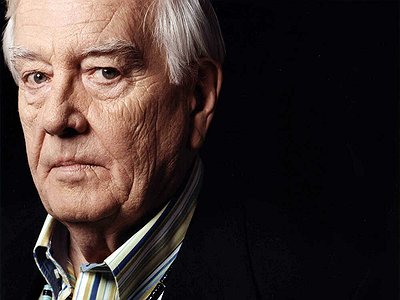Name: Robert Ashley
Nationality: American
Occupation: Composer, vocalist
If you enjoyed this Robert Ashley interview and would like to stay up to date with new releases of his work, visit his official website.
This interview was originally conducted in 2008 at a time when Robert was preparing performances of three new operas. Unfortunately, we never had the chance to follow this up with a conversation on a wider set of topics before his passing in 2014.
Your three most recent operas will be performed “in radically new productions”. What kind of changes exactly will be applied to them?
To take them in order:
"Dust" was commissioned by the Kanagawa Arts Foundation in Yokohama as a second collaboration between me and a Japanese video artist who did the stage design. The stage was one, huge television set, with many partitions, five of which were the singers behind special translucent glass. We toured that a lot.
Then I got tired of the TV look, because you couldn't really see the singers making music. The new design by David Moodey (who designed all three of these productions) is a sort of light-hearted take on "realism." Five homeless people on benches in a park, circa 1985. (Some of the stories are not so light-hearted. I like the contrast.)
"Celestial Excursions" premiered at the Kitchen with the wonderful performance artist, Joan Jonas, on stage above and behind the singers through the whole opera.
I changed the opera so that the third Act is longer and more "dramatic" musically, with an orchestra interlude preceding each solo song (story). In this production Joan performs only during those four interludes. I think this change makes the stories of Act III more interesting.
"Concrete" premiered at LaMama in 2006. It was staged as a group of four people at a gambling casino who all have a "secret" story to tell about an unnamed person who has done something dangerous or unlawful.
We have restaged it, taking away the casino, so that it should appear to be a long meditation-memory by an old man who has had a stroke (and so can't tell the stories of his old friends otherwise.)
I think the new staging isolates the stories and make the characters more mysterious.
Tom Hamilton is responsible for “processing and mixing the voices and the orchestra” during these performances. How much, would you say, are his contributions guiding and shaping the compositions?
I compose the music on computer controlled sequencing programs.
Tom helps me a lot with that technically and with good advice. In the performances his role is more a matter of bringing out the character of the singer by use of "processing and mixing." It's a very important role.
These works morph both according to the input of the soloists and the electronic orchestra. Are you experiencing these concerts, then, rather as a curious listener or as a composer keen to have his work performed in the best possible way?
Since the question seems directed at me, the composer, the answer has to be that I enjoy hearing the work performed "in the best possible way."
I want the audience to hear the rather dramatic differences between the singers. And I want the audience to enjoy the stories as much as I do.
Were “Dust”, “Celestial Excursions” and “Concrete” actually planned as a trilogy from the outset?
The answer is yes, but not in an obvious way, maybe. They were never conceived as a trilogy, but I kept being interested in the groups of people who are "marginalized" in our society: first the homeless ("Dust"); then the people in "assisted living", i.e., old ("Celestial Excursions"); then the people who do things without recognition ("Concrete").
I got involved with the homeless because the homeless lived in a park in front of my building. I got involved with "assisted living" for family reasons. I got involved with memory because I'm quite old and there's a lot of it.
I was also curious about why you especially stressed the fact that you were dealing with “ordinary” people on these three Operas according to a quote on your website – isn’t that what Opera usually deals with anyway, with the discrepancy between the fact that we are all different and yet all “ordinary” and subject to the same forces of love, hate and death?
Opera used to deal with that. But more and more, it seems, the new operas are about "historical celebrities", like Einstein, Nixon, MaoTeSung, Malcolm X, etc.
My point is that those characters are not interesting because the media has helped us to have made up our mind / opinions, whatever they are, and so the narrative meaning is compromised.
By "ordinary" I mean those kinds of people you think you know. I mean, like your mom (unless she's a celebrity).
One of the themes running through at least three of these Operas is age and what it is doing to us. “Old people are interesting because they have no future”, you write and mention Faulkner. After listening to your music, I felt as though I (as a 33-year old) had “understood” something vital about this perspective. But I also felt slightly confused about how I could put this knowledge to practical use.
You can't put your growing understanding about aging to any practical use. That's what makes it so peculiar. I've forgotten what the Faulkner reference refers to.
The question, remains, whether it is really enough to merely “make sound, regardless of whether someone is listening” – or whether there aren't more practical conclusions to be drawn from these sounds after all.
This depends on what sound means to you.
In your quote: “make sound, regardless of whether someone is listening” is sort of like saying "eat, regardless of whether you are hungry in the way you used to be when you were young."
Some people really need sounds.




